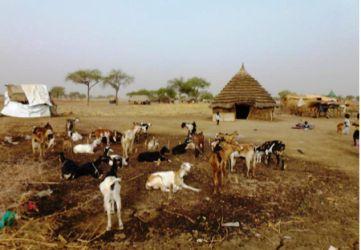South Sudan rejects ‘moral equivalence’ over Abyei
April 11, 2012 (JUBA) – South Sudan said on Wednesday it is running out of patience with what it describes as the international community’s moral equivalence in regard to the disputed territory of Abyei.

“This practice of apportioning blames even when those responsible for their acts are known is not helping. This is what is making Khartoum believes that they have a right on Abyei,” Daniel Awet Akot, a deputy speaker of the country’s national Assembly said on Wednesday
The senior member of the country’s ruling Sudan People’s Liberation Movement (SPLM) said not holding Khartoum to account for its actions over Abyei had emboldened the northern government to the extent that it believes it can carryout attacks inside South Sudan with impunity.
Exactly where the new nation of South Sudan begins and where Sudan ends is unclear in many areas as the border was not demarcated during the six year peace deal that led to partition in July last year.
Over the past two weeks the two countries have clashed over the disputed oil-producing area of Heglig. The international community recognises Heglig as being part of Sudan as it was placed in South Kordofan in 2009 by a tribunal in The Hague.
South Sudan’s army (SPLA) took control of Heglig on Tuesday but claimed they acted after being provoked by a joint air and land assault on Unity State. Sudan admits that the SPLA took control of the area but denies attacking first.
Independently verifying the claims is difficult due to the areas remoteness and the level of insecurity along the border. On Wednesday Sudan’s ambassador to the UN said his country was “ready to retaliate with the same magnitude of their [South Sudan’s] attack” if the security council did not call for the SPLA to withdraw from the area.
“The government in Khartoum believes in violence as a means to settle any disagreement. They do not believe in dialogue. They use dialogue only as tool to strengthen their positions at the negotiating tables. We have seen this behavior several times even when we were at war,” said Awet.
From 1983-2005 the SPLM/A fought various Khartoum governments. Since a coup in 1989 the National Congress Party has ruled Sudan and signed a deal with the SPLA in 2005. But over the six years of power sharing and the nine months since separation the two sides are still to agree on many issues including Abyei, oil, and border demarcation.
Rahamatalla Mohamed Osman, Sudan’s undersecretary of foreign affairs told Reuters on Wednesday that he did not see how negotiations could go ahead “in this climate”.
“What happened yesterday is a violation of international laws and an aggression on Sudan, and we have all the right to defend ourselves and regain the territories which were occupied by government of South Sudan,” he added.
Awet criticised Khartoum’s decision to walk away from talks.
“The position of the government of the republic of South Sudan has always been peaceful dialogue. This dates back to the years of liberation struggle. We have never preferred war as solution. The dialogue has always been our first choice”, said Awet.
ABYEI
The SPLM Co-Chair of the Abyei Joint Oversight Committee (AJOC), Luka Biong Deng, told Sudan Tribune from Agok in southern Abyei that the humanitarian situation in areas he had visited this week were “horrible”.

Biong, who is on a trip to assess the situation in the disputed oil-producing region and its surrounding areas, said on Wednesday that he could not understand why the United Nations Security Council has been unable to pass “a clear standing position” on Abyei, particularly with regard to allowing humanitarian assistance.
With South Sudan voting to seceded in January 2011 Abyei has been left in legal limbo after its own referendum did not go ahead due to Sudan’s ruling NCP insisting that northern Arab nomads – the Misseriya who enter the region for some months of the year – be allowed to vote.
Juba refutes this method of defining those qualified to vote in the Abyei poll and says that only the southern-aligned Dinka Ngok should be permitted voting rights.
Abyei’s peculiar legal status means that providing humanitarian assistance from those displaced last year and those now returning is hindered, as to enter the region humanitarian workers need a Sudanese visa issued from Khartoum.
This is making it hard for the UN Mission in South Sudan (UNMISS) to assist returnees and displaced people, Biong said.
“People in the north of Abyei who returned to their areas are eating wild fruits because humanitarian organisations cannot access these areas from the South”, he said.
After South Sudan’s independence the Khartoum refused to renew the mandate of the UN Mission in Sudan.
UNISFA
In June 2011 South Sudan and Sudan signed a temporary agreement for the administration and security of Abyei was signed in Addis Ababa on 20 June 2011, calling for SAF and SPLA troops in the area be replaced by a United Nations force comprised of Ethiopian peacekeepers.
The United Nations Interim Security Force in Abyei (UNISFA) has a Chapter VII mandate from the UN Security Council but a Status of Forces Agreement has not been signed by Khartoum, severely restricting the effectiveness of the mission despite it approaching full deployment.
However, UNISFA is a military mission that does not have the mandate or capacity of UNMIS to address humanitarian issues. Khartoum has also ensured that no employee from UNMIS can be employed in UNISFA.
In March UNISFA reported to the UN Security Council that both sides had retained ‘unauthorized armed forces in the Abyei Area, in violation of the 20 June 2011 Agreement’.
The situation remains tense with the ongoing large-scale migration of northern Misseriya nomads into the region with their cattle and the return of around 3,000 displaced Ngok Dinka in the past two months.
MISSERIYA MIGRATION
On his trip Biong said he had visited and met with the governors from the three South Sudanese states that border Abyei; Unity, Warrap and Northern Bahr el Ghazal.
In Northern Bahr el Ghazal Biong met with state governor, Paul Malong Awan, to discuss the outcomes of a recent peace conference with the Misseriya. Traditionally the Misseriya make an annual migration into Abyei and areas of South Sudan with their cattle to find pasture during the dry season.
Biong hopes that this year the Misseriya will be persuaded to take a route into South Sudan that avoids creating “traffic” in the tense Abyei area.
“I also visited Unity State and met with Governor Taban Deng Gai and we discussed the same. This is to avoid pressure on Abyei”, he explained.
Biong also wondered why the UN Security Council has not exerted more pressure on the government in Khartoum, to sign the Status of Force Agreement (SOFA), which he said would legalise UNISFA’s mandate.
He echoed remarks of the deputy speaker wondering why the international community, particularly the security council of the United Nations as always been “so soft” on Khartoum for not withdrawing its troops from Abyei.
“I really do not understand why the security council, whenever they are releasing a statement or a resolution continues to call for withdrawal of the two forces when in actual fact they fact know very well Sudan People’s Liberation Army (SPLA) are no longer in the area. The SPLA have already withdrawn. It is now the Sudanese Armed forces which are currently in Abyei”, Biong explained.
The most recent UNSC report on Abyei said that both sides had unauthorised forces in the area.
Biong, a native of Abyei, served as the cabinet affairs minister in the the power sharing government – between the south’s SPLM and Khartom’s NCP – that lasted for six years until South Sudan seceded in July last year – a month after SAF took control of Abyei.
(ST)
